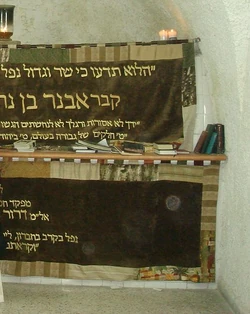
Tomb of Abner
In the Samuel, Abner (Biblical Hebrew for "father of [or is a] light"), is first cousin to Saul and commander-in-chief of his army (1 Samuel 14:50, 20:25).
Biography[]
Abner is only referred to incidentally in Saul's history (1 Samuel 17:55, 26:5), and is not mentioned in the account of the disastrous battle of Gilboa when Saul's power was crushed. Seizing the youngest but only surviving of Saul's sons, Ishbaal, Abner set him up as king over Israel at Mahanaim, east of the Jordan. David, who was accepted as king by Judah alone, was meanwhile reigning at Hebron, and for some time war was carried on between the two parties.
The only engagement between the rival factions which is told at length is noteworthy, inasmuch as it was preceded by an encounter at Gibeon between twelve chosen men from each side, in which the whole twenty-four seem to have perished (2 Samuel 2:12). In the general engagement which followed, Abner was defeated and put to flight. He was closely pursued by Asahel, brother of Joab, who is said to have been "light of foot as a wild roe" (2 Samuel 2:18). As Asahel would not desist from the pursuit, though warned, Abner was compelled to slay him in self-defence. This originated a deadly feud between the leaders of the opposite parties, for Joab, as next of kin to Asahel, was by the law and custom of the country the avenger of his blood. However, according to Josephus, in Antiquities, Book 7, Chapter 1, Joab had forgiven Abner for the death of his brother, Asahel, the reason being that Abner had slain Asahel honorably in combat after he had first warned Asahel and had no other choice but to kill him out of self defense. This battle was part of a civil war between David and Ishbosheth, the son of Saul. After this battle Abner switched to the side of David and granted him control over the tribe of Benjamin. This act put Abner in David's favor. The real reason that Joab killed Abner was that he became a threat to his rank of general. He then justifies it later by mentioning his brother.
For some time afterwards the war was carried on, the advantage being invariably on the side of David. At length, Ishbaal lost the main prop of his tottering cause by remonstrating with Abner for marrying Rizpah, one of Saul's concubines, an alliance which, according to contemporary notions, implied pretensions to the throne (cf. 2 Samuel 16:21ff.).
Abner was indignant at the deserved rebuke, and immediately opened negotiations with David, who welcomed him on the condition that his wife Michal should be restored to him. This was done, and the proceedings were ratified by a feast. Almost immediately after, however, Joab, who had been sent away, perhaps intentionally returned and slew Abner at the gate of Hebron. The ostensible motive for the assassination was a desire to avenge Asahel, and this would be a sufficient justification for the deed according to the moral standard of the time. The conduct of David after the event was such as to show that he had no complicity in the act, though he could not venture to punish its perpetrators (2 Samuel 3:31-39; cf. 1 Kings 2:31ff.).
Abner was buried in Hebron. His tomb, according to a medieval Jewish tradition, is considered to be in a building not far from the Cave of the Patriarchs.
Soon however, Ishbaal was assassinated as he slept, and David became king of the reunited kingdoms.
External links[]
![]() This article incorporates text from the Encyclopædia Britannica Eleventh Edition, a publication now in the public domain.
This article incorporates text from the Encyclopædia Britannica Eleventh Edition, a publication now in the public domain.
| This page uses Creative Commons Licensed content from Wikipedia (view authors). |